BusinessEurope Headlines No. 2016-15
Markus J. Beyrer speaks at EU-Turkey high-level economic dialogue
 The EU and Turkey have developed a multidimensional relationship over the years; our two economies are closely connected through strong trade and investment flows. The EU is Turkey’s main trading partner while Turkey is the 5th trading partner for the EU. The current political and geostrategic developments are creating new challenges but they can also provide opportunities to solve long-standing issues and bring our economies closer. During the EU-Turkey High Level Economic Dialogue on 25 April, chaired by European Commission Vice-President Jyrki Katainen and Turkey Deputy Prime-Minister Mehmet Şimşek, participants discussed how to develop further trade and investment ties, namely through modernisation of the Customs Union and inclusion of important areas like public procurement, services and agriculture. BusinessEurope Director General Markus J. Beyrer highlighted the importance of promoting harmonisation of the regulatory frameworks in the EU and Turkey, using also the opportunity to establish a neutral and effective dispute settlement mechanism. Recognising Turkey’s interest in benefitting from TTIP, we should explore possible solutions like inclusion of a dock-on mechanism in the agreement.
The EU and Turkey have developed a multidimensional relationship over the years; our two economies are closely connected through strong trade and investment flows. The EU is Turkey’s main trading partner while Turkey is the 5th trading partner for the EU. The current political and geostrategic developments are creating new challenges but they can also provide opportunities to solve long-standing issues and bring our economies closer. During the EU-Turkey High Level Economic Dialogue on 25 April, chaired by European Commission Vice-President Jyrki Katainen and Turkey Deputy Prime-Minister Mehmet Şimşek, participants discussed how to develop further trade and investment ties, namely through modernisation of the Customs Union and inclusion of important areas like public procurement, services and agriculture. BusinessEurope Director General Markus J. Beyrer highlighted the importance of promoting harmonisation of the regulatory frameworks in the EU and Turkey, using also the opportunity to establish a neutral and effective dispute settlement mechanism. Recognising Turkey’s interest in benefitting from TTIP, we should explore possible solutions like inclusion of a dock-on mechanism in the agreement.
Contact: Luisa Santos
Newest connectivity technologies presented to Chancellor Merkel and President Obama
 Present at the Hannover Messe this week, German Federal Chancellor Angela Merkel and US President Barack Obama talked about Europe’s digital future and challenges with Peter Köhler, Chair of BusinessEurope’s Industrial Affairs Committee and CEO of the Weidmüller group. The Committee, which met on the occasion in Hannover, discussed the forthcoming power market design reform, the on-going EU ETS reform and the action plan on digitising industry recently published by the European Commission. About the reform of the Emission Trading Scheme, BusinessEurope recently adopted views about the tiered approach and the recent French-UK proposal on implementation of tiered free allocation in phase IV of the ETS. Whereas addressing the right question - i.e. how to avoid application of the cross-sectoral correction factor - it does not provide the right answer as it goes against the principle that best performing industrial plants on the carbon leakage list receive 100% of free allowances. A better way forward exists and must be given priority. In particular, the legislative proposal must be amended to increase the amount of free allowances in phase IV. (Photo copyright: ZVEI.org)
Present at the Hannover Messe this week, German Federal Chancellor Angela Merkel and US President Barack Obama talked about Europe’s digital future and challenges with Peter Köhler, Chair of BusinessEurope’s Industrial Affairs Committee and CEO of the Weidmüller group. The Committee, which met on the occasion in Hannover, discussed the forthcoming power market design reform, the on-going EU ETS reform and the action plan on digitising industry recently published by the European Commission. About the reform of the Emission Trading Scheme, BusinessEurope recently adopted views about the tiered approach and the recent French-UK proposal on implementation of tiered free allocation in phase IV of the ETS. Whereas addressing the right question - i.e. how to avoid application of the cross-sectoral correction factor - it does not provide the right answer as it goes against the principle that best performing industrial plants on the carbon leakage list receive 100% of free allowances. A better way forward exists and must be given priority. In particular, the legislative proposal must be amended to increase the amount of free allowances in phase IV. (Photo copyright: ZVEI.org)
Read more or contact: Alexandre Affre
EU-Vietnam free-trade agreement: reinforcing our presence in Asia
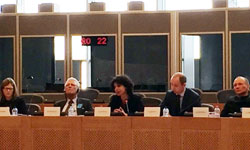 The conclusion of the EU-Vietnam free-trade agreement is an important step to ensure that the EU remains an active player in one of the fastest growing regions in the world. At a seminar organised in the European Parliament on 27 April, BusinessEurope highlighted the importance of concluding ambitious agreements with countries in Asia and stepping up efforts to create a trade and investment environment that is more conducive to EU companies. With the conclusion of the Transpacific Partnership Agreement the EU needs to speed up its negotiations with countries in Asia to ensure our companies retain competitive advantages. The agreement with Vietnam can be a blueprint for other agreements in the region in many areas, including market access for goods and services, public procurement or competition. It can also be an incentive for other countries in the region to negotiate and agree on a similar framework with the EU.
The conclusion of the EU-Vietnam free-trade agreement is an important step to ensure that the EU remains an active player in one of the fastest growing regions in the world. At a seminar organised in the European Parliament on 27 April, BusinessEurope highlighted the importance of concluding ambitious agreements with countries in Asia and stepping up efforts to create a trade and investment environment that is more conducive to EU companies. With the conclusion of the Transpacific Partnership Agreement the EU needs to speed up its negotiations with countries in Asia to ensure our companies retain competitive advantages. The agreement with Vietnam can be a blueprint for other agreements in the region in many areas, including market access for goods and services, public procurement or competition. It can also be an incentive for other countries in the region to negotiate and agree on a similar framework with the EU.
Contact: Luisa Santos
Innovation Principle: high potential for a more positive perception of innovation
 "We must ask ourselves what we could do differently to make the EU a better place to innovate in. We need to promote a more positive attitude and gain increased acceptance for innovation in Europe by informing citizens. The Innovation Principle has the potential to create a more positive perception of innovation, it therefore needs to be further developed", Alexandre Affre, BusinessEurope Director for Industrial Affairs, stressed at an event organised in the European Parliament by Knowledge 4 Innovation (K4I) on 25 April. K4I, working closely with members of the European Parliament, recently published a ‘Pact for Innovation’. This kick-off event brought together pro-innovation stakeholders.
"We must ask ourselves what we could do differently to make the EU a better place to innovate in. We need to promote a more positive attitude and gain increased acceptance for innovation in Europe by informing citizens. The Innovation Principle has the potential to create a more positive perception of innovation, it therefore needs to be further developed", Alexandre Affre, BusinessEurope Director for Industrial Affairs, stressed at an event organised in the European Parliament by Knowledge 4 Innovation (K4I) on 25 April. K4I, working closely with members of the European Parliament, recently published a ‘Pact for Innovation’. This kick-off event brought together pro-innovation stakeholders.
Contact: Alexandre Affre
Services across borders: enforce existing rules and promote opportunities
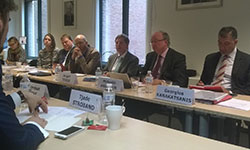 Barriers that companies still face when wishing to provide services across borders have partly to do with uneven implementation of existing legislation, but also with some persistent obstacles. Those are linked to strains on company mobility, legal fragmentation and diverse national standards. “What we need is a combination of measures to ensure better implementation of agreed rules and new initiatives to further integrate services markets”, BusinessEurope Senior Adviser Jeroen Hardenbol stressed during an EPC roundtable on the single market for services on 26 April. The single market strategy presented by the European Commission in October 2015 proposes some promising initiatives such as the Services Passport, a new notification procedure for service requirements and a “single digital gateway” that - if well-designed - will all contribute to a better functioning single market. The political will shown in recent Council conclusions needs to be translated into concrete actions that make a real difference for companies, in particular start-ups and SMEs.
Barriers that companies still face when wishing to provide services across borders have partly to do with uneven implementation of existing legislation, but also with some persistent obstacles. Those are linked to strains on company mobility, legal fragmentation and diverse national standards. “What we need is a combination of measures to ensure better implementation of agreed rules and new initiatives to further integrate services markets”, BusinessEurope Senior Adviser Jeroen Hardenbol stressed during an EPC roundtable on the single market for services on 26 April. The single market strategy presented by the European Commission in October 2015 proposes some promising initiatives such as the Services Passport, a new notification procedure for service requirements and a “single digital gateway” that - if well-designed - will all contribute to a better functioning single market. The political will shown in recent Council conclusions needs to be translated into concrete actions that make a real difference for companies, in particular start-ups and SMEs.
Read more or contact: Jeroen Hardenbol
Geo-blocking: addressing remaining fragmentation in the single market first
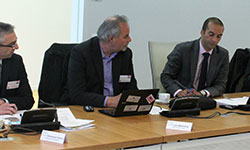 While it is important to address unjustified geo-blocking, the current reality of a highly fragmented single market for both goods and services should be duly taken into account. This was highlighted on 26 April by BusinessEurope Deputy Director Guido Lobrano at the Ecommerce Europe high-level roundtable on geo-blocking hosted by MEP Kaja Kallas and the Dutch Presidency. The European Commission should, on a case-by-case basis, carefully analyse justified reasons for different treatment such as diverse market conditions or different national regulations. Addressing existing regulatory fragmentation in the single market in the first place is the best way to limit differential treatment.
While it is important to address unjustified geo-blocking, the current reality of a highly fragmented single market for both goods and services should be duly taken into account. This was highlighted on 26 April by BusinessEurope Deputy Director Guido Lobrano at the Ecommerce Europe high-level roundtable on geo-blocking hosted by MEP Kaja Kallas and the Dutch Presidency. The European Commission should, on a case-by-case basis, carefully analyse justified reasons for different treatment such as diverse market conditions or different national regulations. Addressing existing regulatory fragmentation in the single market in the first place is the best way to limit differential treatment.
Read more or contact: Guido Lobrano
More digitalisation needed in company law
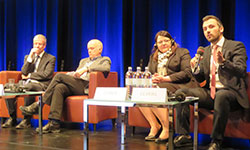 It is essential to create favourable conditions for the use of digital tools throughout the lifecycle of companies. For example, it is still not possible to register a company online in half of the EU member states. In Europe, entrepreneurs still need to wait 30 days from registration until they can start running their business – which is not compatible with today’s fast digital pace. Measures to tackle this should be diverse in nature and include safeguards to protect legal certainty, privacy and avoid abuses. These messages were voiced by BusinessEurope Senior Adviser Pedro Oliveira at the 28th conference of European Civil-Law Notaries in Salzburg on 22 April.
It is essential to create favourable conditions for the use of digital tools throughout the lifecycle of companies. For example, it is still not possible to register a company online in half of the EU member states. In Europe, entrepreneurs still need to wait 30 days from registration until they can start running their business – which is not compatible with today’s fast digital pace. Measures to tackle this should be diverse in nature and include safeguards to protect legal certainty, privacy and avoid abuses. These messages were voiced by BusinessEurope Senior Adviser Pedro Oliveira at the 28th conference of European Civil-Law Notaries in Salzburg on 22 April.
Contact: Pedro Oliveira
Digitalisation at work: adapt to change, seize opportunities
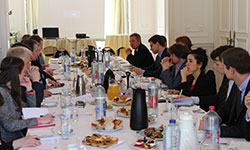 "Don’t be afraid of digitalisation at work! New jobs will emerge – leading to overall employment gains", Cecilia Zappalà, BusinessEurope Adviser for the digital economy, said on 21 April at an event organised by the Konrad Adenauer Foundation in Brussels. Digitalisation, she reminded the audience, brings more autonomy and flexibility in work organisation. It offers more learning opportunities and can help better balance work and private life. In this context, it is key that workers are equipped with the right skills. Labour market policies should also aim to re-skill and up-skill those who will be affected by digitalisation.
"Don’t be afraid of digitalisation at work! New jobs will emerge – leading to overall employment gains", Cecilia Zappalà, BusinessEurope Adviser for the digital economy, said on 21 April at an event organised by the Konrad Adenauer Foundation in Brussels. Digitalisation, she reminded the audience, brings more autonomy and flexibility in work organisation. It offers more learning opportunities and can help better balance work and private life. In this context, it is key that workers are equipped with the right skills. Labour market policies should also aim to re-skill and up-skill those who will be affected by digitalisation.
Read more or contact: Cecilia Zappalà
Calendar

- 3 May 2016: World Press Freedom Day, Brussels
- 5 May 2016: United Kingdom regional elections (Scotland, Wales, Northern Ireland)
- 9 May 2016: Europe Day
- 10-13 May 2016: Adaptation Futures, international climate change conference, Rotterdam